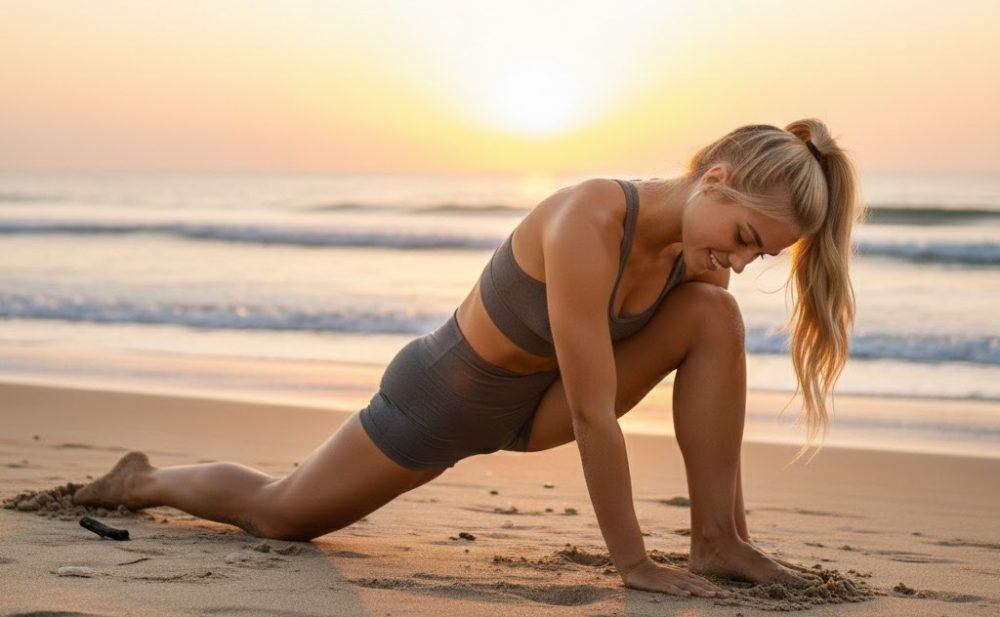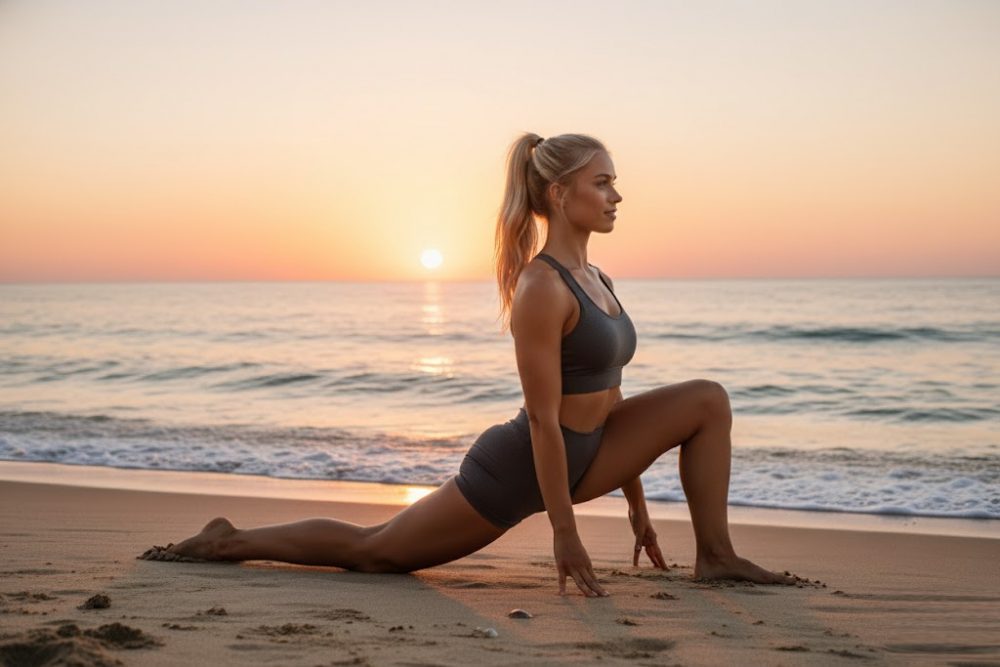Contents
- 1 Quad Stretch Exercises: Best Stretches for Flexibility and Mobility
- 1.1 Benefits of Quad Stretching
- 1.2 Increases Flexibility and Mobility
- 1.3 Prevents Injuries and Reduces Knee Pain
- 1.4 Improves Posture and Lower Back Health
- 1.5 Enhances Athletic Performance
- 1.6 Aids in Muscle Recovery
- 1.7 Supports Joint Health and Longevity
- 1.8 Improves Balance and Coordination
- 1.9 Step-by-Step Guide to the Best Quad Stretch Exercises
- 1.10 Standing Quad Stretch
- 1.11 Lying Side Quad Stretch
- 1.12 Kneeling Quad Stretch
- 1.13 Couch Stretch
- 1.14 Frog Stretch (Quad-Focused Version)
- 1.15 Recommended Sets for Best Results
- 1.16 Variations to Personalize Your Stretching Routine
- 1.17 Recommendations for Optimal Results
- 1.18 Related Exercises That Complement Quad Stretching
- 1.19 Frequently Asked Questions
- 1.19.1 What exactly is a quad stretch and what muscles does it target?
- 1.19.2 Why are quad stretches important?
- 1.19.3 When is the best time to stretch the quads?
- 1.19.4 How do I perform a quad stretch correctly?
- 1.19.5 How long should I hold each quad stretch?
- 1.19.6 Can quad stretches help with knee pain?
- 1.19.7 Are quad stretches safe to do every day?
- 1.20 Conclusion
- 1.21 Related
Quad Stretch Exercises: Best Stretches for Flexibility and Mobility
Benefits of Quad Stretching
The quadriceps drive knee extension and hip flexion—two core functions behind walking, running, jumping, climbing stairs, and every meaningful lower-body movement. When these muscles tighten up, you pay the price with stiffness, reduced mobility, and a higher risk of injuries. Strategic quad stretching drives meaningful performance outcomes and keeps your movement mechanics clean.
Increases Flexibility and Mobility
Tight quads limit your knee and hip range, creating tension and inefficient movement patterns. Consistent stretching lengthens the muscle fibers and restores full mobility. Day-to-day activities like squatting down, walking uphill, and stepping into your car become smoother when your quads are no longer pulling you into stiffness.
Prevents Injuries and Reduces Knee Pain
When the quadriceps shorten, they tug on the knee joint, increasing stress on the patellar tendon. This often leads to issues such as runner’s knee or jumper’s knee. Quad stretching helps restore muscular balance, reduces knee strain, and keeps the joint tracking better. For runners, cyclists, and athletes training regularly, this is a non-negotiable component of long-term performance.
Improves Posture and Lower Back Health
Many people walk around with an anterior pelvic tilt caused by tight quads. This exaggerated lower-back arch leads to lumbar discomfort and hip tension. Stretching the quadriceps helps correct pelvic alignment, reducing unnecessary pressure on the lumbar spine. The downstream effect is better posture and a more efficient standing and walking stance.
Enhances Athletic Performance
Whether you’re sprinting, jumping, or lifting heavy, flexible quads contribute to power production. When the quads are tight, your stride shortens, your squat depth suffers, and your explosiveness drops. Greater flexibility allows the muscle fibers to contract fully, improving performance across all lower-body movements.
Aids in Muscle Recovery
Hard training creates micro-tears in muscle tissue, resulting in soreness and inflammation. Stretching boosts circulation, accelerating the delivery of nutrients needed for recovery. This reduces stiffness, improves comfort between workout sessions, and helps you maintain consistency in your training schedule.
Supports Joint Health and Longevity
The quads stabilize the knee joint. If they become chronically tight, the knee absorbs more stress than it should. Stretching preserves joint integrity, reduces wear and tear, and supports long-term knee health. Maintaining flexible quads is one of the most effective ways to keep your lower body healthy as you age.
Improves Balance and Coordination
Quad flexibility influences leg stability and weight distribution. When the quads can move freely, your balance improves and your movement patterns become cleaner. This matters not only for sports but also for everyday tasks—especially for older adults or anyone recovering from lower-body injuries.
Step-by-Step Guide to the Best Quad Stretch Exercises
Below are the top quad stretches to build flexibility, mobility, and total lower-body efficiency. Execute each movement with precision to maximize results.
Standing Quad Stretch
Stand with your feet hip-width apart. Grab your right ankle with your right hand and draw your heel toward your glutes. Keep your knees close and your core engaged. Hold for 20-30 seconds before switching legs. This option is simple, fast, and ideal for warming up before training.

Lying Side Quad Stretch
Lie on your side with both legs stacked. Bend your top knee, grab your ankle, and pull the heel toward your glutes. Keep your hips aligned and avoid arching your lower back. Hold for 20-30 seconds per side. This stretch isolates the quad without compromising stability.
Kneeling Quad Stretch
Kneel on one knee with the opposite foot flat on the ground in front of you. Reach back and grab the ankle of the kneeling leg, pulling it gently toward your glutes. Keep your hips pushed forward and your core tight. Hold for 20-30 seconds. This variation stretches the quad while engaging the hip flexors.

Couch Stretch
Place your back foot up on a couch or against a wall while kneeling on the opposite leg. Sit tall, brace your core, and gradually lean back. Maintain the position for 30-40 seconds before switching legs. This is one of the most powerful quad and hip flexor stretches available.
Frog Stretch (Quad-Focused Version)
Start on all fours. Spread your knees wide and lower your elbows to the floor. Gently push your hips back and point your toes outward. Hold for 30 seconds. While traditionally used for the groin, this version lengthens the quads and hips simultaneously.

Recommended Sets for Best Results
To build measurable quad flexibility, execute each stretch for 20-40 seconds and complete 2-4 rounds per leg. For deeper mobility work, extend the holds to 45–60 seconds on your final round. Maintain a consistent weekly cadence—3 to 5 days per week yields the fastest progress.
Variations to Personalize Your Stretching Routine
- Seated Quad Stretch: Ideal for beginners or individuals with balance limitations.
- Prone Quad Stretch: Lying face-down helps isolate the quads without pulling on the lower back.
- Standing Quad Stretch with Strap: Excellent for people with tight hip flexors or limited mobility.
- Wall-Assisted Quad Stretch: Adds extra tension and control for deeper stretching.
- Pigeon-Quad Hybrid Stretch: Combines glute and quad release for full lower-body mobility.
Recommendations for Optimal Results
Warm up before stretching with 3–5 minutes of light activity.
Avoid forcing the stretch—aim for tension, never pain.
Control your breathing to help the muscle release.
Balance flexibility with strength work to protect the knees and hips.
Stay consistent; mobility improvements come from repetition.
Pair your quad stretches with lower-body strength training like squats, lunges, and deadlifts to maximize functional performance.

Related Exercises That Complement Quad Stretching
- Hamstring Stretch: Balances quad flexibility and improves posterior chain mobility.
- Hip Flexor Stretch: Reduces anterior-pelvic tilt and enhances hip mobility.
- Glute Bridge: Strengthens the glutes to support knee and hip alignment.
- Calf Stretch: Completes the lower-leg mobility chain.
- Neck Stretch: Helps release tension in the upper body after training.
- Warrior 1 Pose: A powerful yoga posture that engages the quads, hips, and core.
- Child’s Pose with Side Reach: Relaxes the back and enhances breathing control.
Frequently Asked Questions
What exactly is a quad stretch and what muscles does it target?
A quad stretch targets the quadriceps, the large muscle group on the front of the thigh responsible for knee extension and hip movement. When I stretch my quads, I’m reducing tightness in the front of the leg and improving overall lower-body mobility.
Why are quad stretches important?
Quad stretches help maintain healthy knee and hip function. Tight quadriceps can pull on the knee joint and limit hip movement, which affects walking, running, squatting, and athletic performance. Regular stretching keeps the muscles balanced and reduces unnecessary tension.
When is the best time to stretch the quads?
I stretch my quads after workouts or when my muscles are warm. Post-training is ideal because the tissue is more receptive. I may also stretch them lightly on rest days to maintain flexibility and reduce stiffness from sitting or repetitive activity.
How do I perform a quad stretch correctly?
I keep my torso upright, knees close together, and gently pull the heel toward the glutes without arching my lower back. The stretch should be felt in the front of the thigh, not in the knee or lower back.
How long should I hold each quad stretch?
I hold each stretch for 20 to 30 seconds and repeat it two to three times per leg. The focus is controlled breathing and gradual relaxation, not forcing the range.
Can quad stretches help with knee pain?
Yes. Tight quadriceps often contribute to knee discomfort by increasing stress on the joint. Stretching the quads helps improve alignment and reduces strain, especially when combined with strengthening and proper movement mechanics.
Are quad stretches safe to do every day?
Yes. Quad stretches are safe for daily practice as long as they’re done gently and with proper form. Daily stretching helps maintain flexibility and keeps the legs feeling loose and mobile.
Conclusion
Quad stretching is a foundational component of long-term mobility, athletic performance, and joint health. These muscles handle an enormous workload every day, and when they tighten up, it affects everything—from posture to athletic power to basic movement efficiency. Incorporating quad stretches into your routine helps you move better, feel better, and perform at a higher level.
Make these stretches part of your weekly workflow and stay consistent. Once you lean into the routine, the payoff becomes obvious—improved mobility, reduced tension, stronger posture, and smoother movement across the board.
Follow our Social Media!













